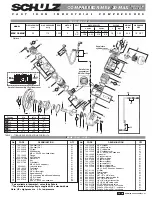
16
Maintenance
GENERAL MAINTENANCE
□
Condensate forms in the tank when
there is humidity in the air. Depending on
the environmental conditions, drain the
condensate daily and/or every hour. For
instructions, see
Draining the tank
on page 15.
□
The safety valve automatically releases air
when the receiver pressure exceeds the
preset maximum.
□
Inspect the tank annually for rust, pin holes,
or other imperfections that could cause it to
become unsafe.
□
Avoid using solvents when cleaning plastic
parts. Most plastics are susceptible to damage
from various types of commercial solvents and
may be damaged by their use.
□
Use clean cloths to remove dirt, dust, oil,
grease, etc.
□
Any service, other than general maintenance,
should be performed by an authorized
service representative.
LUBRICATION
All of the bearings in this tool are lubricated with a
sufficient amount of high grade lubricant for the life of
the unit under normal operating conditions. Therefore,
no further lubrication of the bearings is required.
CLEANING THE AIR FILTER
From time to time, the air filter needs to be removed
and cleaned.
□
Turn the air compressor OFF (O).
□
Unplug the air compressor.
□
Unsnap the air filter cover (1) to remove.
□
Remove the air filter (2) from the air filter
housing (3).
□
Blow compressed air through the air filter for
10-15 seconds.
WARNING:
When servicing, use only identical Husky
replacement parts. Use of any other parts may create a
hazard or cause product damage.
WARNING:
Always release all pressure, disconnect from
power supply, and allow unit to cool to the touch before
cleaning or making repairs on the air compressor.
WARNING:
Do not at any time let brake fluids, gasoline,
petroleum-based products, penetrating oils, etc., come
in contact with plastic parts. Chemicals can damage,
weaken or destroy plastic which may result in serious
personal injury. Electric tools used on fiberglass material,
wallboard, spackling compounds, or plaster are subject to
accelerated wear and possible premature failure because
the fiberglass chips and grindings are highly abrasive to
bearings, brushes, commutators, etc. Consequently, we
do not recommended using this tool for extended work on
these types of materials. However, if you do work with any
of these materials, it is extremely important to clean the
tool using compressed air.
1
2
3
Care and Cleaning
□
Drain the air tank of moisture after operation.
□
When not in use, store the compressor in a cool, dry place.
□
Disconnect the air hose and hang open ends down to allow any moisture to drain.
□
Protect the electrical cord and air hose from damage (such as being stepped on or run over). Wind them
loosely around the compressor handle.
















































